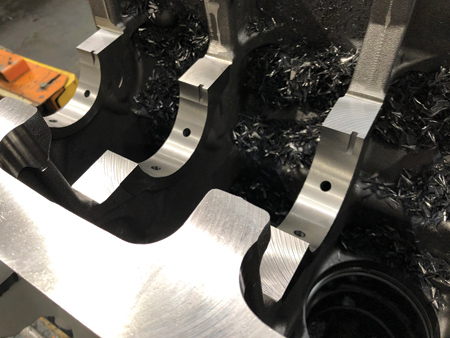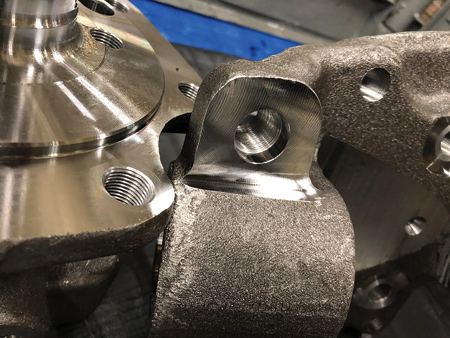
A crankcase for a large commercial truck. For today's automotive machining, the REGO-FIX poweRgrip system uses an automated toolsetter that performs a complete press-in in under 10 seconds, a 1,100 Nm clamping torque rating and 0.0001" TIR.

Components for a large truck axle assembly. "With new challenges on automotive manufacturing production lines, including ceramic tools as well as new materials, the need for the precision, vibration damping and heat-free toolsetting from REGO-FIX powRgrip toolholders is even more critical," said a company spokesperson.
Hybrid and electric vehicles have already begun to transform the automotive industry-and its production processes. When GM announced in 2021 that it planned to end gas-powered vehicle production by 2035, two years after Audi's projected changeover, the shift from fuel-based to material-based energy systems reached a new level of momentum. Forecasts suggest that by 2035, battery electric vehicles (BEVs) will make up more than half of all new passenger vehicles, even without tax incentives or other inducements to switch. To optimize these new technologies, suppliers must machine new materials with greater precision than ever before.
This move toward new materials supports the big push to lighten the weight of all hybrid and electric vehicles. Because the combined weight of electric drivetrains and batteries often still exceeds internal combustion engine (ICE) powertrain equivalents, manufacturers constantly look for new ways to shed pounds. When a 10% weight cut can produce an 8% increase in drive range, lightweighting takes on even greater significance-especially in other areas of the vehicle, where manufacturers can begin to offset still-heavy battery packs with new materials.
Many of today's electric vehicles still look virtually identical to their fuel-powered counterparts, down to the transformation of the fuel-filler door into the plug-in port. This design carryover often limits the size and therefore the charge capacity of battery packs. Gradually, however, BEVs have begun to change the way manufacturers approach material specifications. As manufacturers move from ICEs, with more than 2,000 moving parts, to BEVs with only about 20, they replace the heavy steel and cast iron that dominate ICE production with aluminum, titanium, composites and even additive manufactured (AM) parts.
Where they fit cost effectively into the overall price of a vehicle, lightweight alloys, and even carbon fiber parts, can make smart additions to vehicle designs, so long as they do not compromise vehicle integrity and safety. But the biggest challenge of broadening the range of materials for vehicle production lies in finding the right ways to machine them.
As a result, machining precision becomes an even greater concern for suppliers, challenging their machine tools, cutting tools and toolholding. To achieve high-volume, high-precision results with demanding materials and parts, toolholding manufacturer REGO-FIX developed its powRgrip (PG) system, which provides the utmost in stability, precision and tool life for high-speed production with all types of tools and materials. With new challenges on manufacturing production lines, including ceramic tools as well as new materials, the physics of PG press-fit toolholding favor precision, with greater vibration damping and heat-free toolsetting than other options can offer.
"Heat-shrink and hydraulic toolsetting have a long history and many adherents, but these systems come with some disadvantages," said a company spokesperson. "When a toolsetting process relies on heat, the constant exposure to high temperatures ages toolholders prematurely. Because the heat-shrink process actually enlarges the dimensions of the toolholder, shops often have trouble gauging how to set up their tools and how long to wait before they can use them, and must deal with potentially hazardous fumes. Hydraulic systems fare poorly in machining processes that generate considerable heat, such as the ceramic tools that are gaining in importance to machine aluminum. The REGO-FIX PG system uses an automated toolsetter that performs a complete press-in in under 10 seconds, ready for immediate use, and achieves a 1,100 Nm clamping torque rating, the industry's highest. Its 0.0001 inch TIR is guaranteed throughout five years or 20,000 toolsetting cycles."
Just as toolholding options can transform the precision of a manufacturing line, consumer demand will accelerate the shift from ICE vehicles to BEV. Today, electric cars may still cost more to purchase than fueled alternatives do, but many BEVs cost less in lifetime operations because they lack the expensive powertrain of ICE vehicles. As electric vehicles grow in popularity and the production of fuel-powered options begins to slow, depreciated values of ICE-based vehicles will begin to plummet. Consumers will rethink their commitment to fuel power and invest in BEVs sooner to protect the long-term value of their vehicles.
The automotive industry may herald electric cars as its latest push toward sustainability, but the technology is far from new. The first electric cars appeared in the 1830s, well ahead of Karl Benz's 1886 patent for a gas-fueled car. One decade into the 20th century, 30% of vehicles used electric power, but ICE gained momentum because it extended driving range beyond what electrics could achieve. Before vehicle manufacturers can optimize today's designs for electric power, however, they must move away from the mindset that considers EVs to be gas-powered cars minus the engine, transmission, oil and fuel tanks. During the transition from ICE to hybrid and then to BEV, manufacturers must begin to redefine the fundamental nature of personal transportation.
The transition to BEVs means new types of vehicles, new automotive companies, increased customization options for customers and a greater focus on innovation. "As these trends begin to dominate more and more of the automotive industry's needs, REGO-FIX toolholding continues to offer suppliers the high accuracy, ultra-low runout, tool security and vibration damping that produces clean cuts and meets tight tolerances," said the spokesperson.
Authored by REGO-FIX
For more information contact:
REGO-FIX Tool Corporation
4420 Anson Blvd.
Whitestown, IN 46075
800-REGO-FIX / 317-870-5959
info@rego-fix.com
www.rego-fix.com